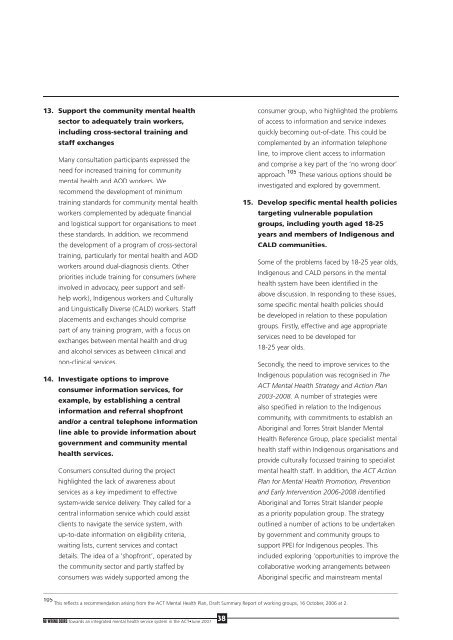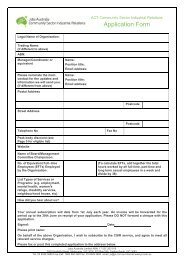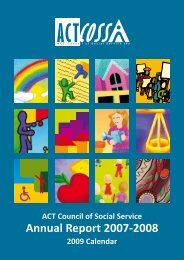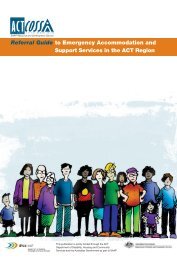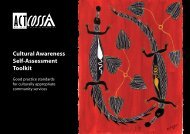actcoss text final.indd - ACT Council of Social Service
actcoss text final.indd - ACT Council of Social Service
actcoss text final.indd - ACT Council of Social Service
You also want an ePaper? Increase the reach of your titles
YUMPU automatically turns print PDFs into web optimized ePapers that Google loves.
13. Support the community mental health<br />
sector to adequately train workers,<br />
including cross-sectoral training and<br />
staff exchanges<br />
Many consultation participants expressed the<br />
need for increased training for community<br />
mental health and AOD workers. We<br />
recommend the development <strong>of</strong> minimum<br />
training standards for community mental health<br />
workers complemented by adequate financial<br />
and logistical support for organisations to meet<br />
these standards. In addition, we recommend<br />
the development <strong>of</strong> a program <strong>of</strong> cross-sectoral<br />
training, particularly for mental health and AOD<br />
workers around dual-diagnosis clients. Other<br />
priorities include training for consumers (where<br />
involved in advocacy, peer support and selfhelp<br />
work), Indigenous workers and Culturally<br />
and Linguistically Diverse (CALD) workers. Staff<br />
placements and exchanges should comprise<br />
part <strong>of</strong> any training program, with a focus on<br />
exchanges between mental health and drug<br />
and alcohol services as between clinical and<br />
non-clinical services.<br />
14. Investigate options to improve<br />
consumer information services, for<br />
example, by establishing a central<br />
information and referral shopfront<br />
and/or a central telephone information<br />
line able to provide information about<br />
government and community mental<br />
health services.<br />
Consumers consulted during the project<br />
highlighted the lack <strong>of</strong> awareness about<br />
services as a key impediment to effective<br />
system-wide service delivery. They called for a<br />
central information service which could assist<br />
clients to navigate the service system, with<br />
up-to-date information on eligibility criteria,<br />
waiting lists, current services and contact<br />
details. The idea <strong>of</strong> a ‘shopfront’, operated by<br />
the community sector and partly staffed by<br />
consumers was widely supported among the<br />
consumer group, who highlighted the problems<br />
<strong>of</strong> access to information and service indexes<br />
quickly becoming out-<strong>of</strong>-date. This could be<br />
complemented by an information telephone<br />
line, to improve client access to information<br />
and comprise a key part <strong>of</strong> the ‘no wrong door’<br />
approach. 105 These various options should be<br />
investigated and explored by government.<br />
15. Develop specific mental health policies<br />
targeting vulnerable population<br />
groups, including youth aged 18-25<br />
years and members <strong>of</strong> Indigenous and<br />
CALD communities.<br />
Some <strong>of</strong> the problems faced by 18-25 year olds,<br />
Indigenous and CALD persons in the mental<br />
health system have been identified in the<br />
above discussion. In responding to these issues,<br />
some specific mental health policies should<br />
be developed in relation to these population<br />
groups. Firstly, effective and age appropriate<br />
services need to be developed for<br />
18-25 year olds.<br />
Secondly, the need to improve services to the<br />
Indigenous population was recognised in The<br />
<strong>ACT</strong> Mental Health Strategy and Action Plan<br />
2003-2008. A number <strong>of</strong> strategies were<br />
also specified in relation to the Indigenous<br />
community, with commitments to establish an<br />
Aboriginal and Torres Strait Islander Mental<br />
Health Reference Group, place specialist mental<br />
health staff within Indigenous organisations and<br />
provide culturally focussed training to specialist<br />
mental health staff. In addition, the <strong>ACT</strong> Action<br />
Plan for Mental Health Promotion, Prevention<br />
and Early Intervention 2006-2008 identified<br />
Aboriginal and Torres Strait Islander people<br />
as a priority population group. The strategy<br />
outlined a number <strong>of</strong> actions to be undertaken<br />
by government and community groups to<br />
support PPEI for Indigenous peoples. This<br />
included exploring ‘opportunities to improve the<br />
collaborative working arrangements between<br />
Aboriginal specific and mainstream mental<br />
___________________________________________________________________________________________________________________________<br />
105 This reflects a recommendation arising from the <strong>ACT</strong> Mental Health Plan, Draft Summary Report <strong>of</strong> working groups, 16 October, 2006 at 2.<br />
NO WRONG DOORS Towards an integrated mental health service system in the <strong>ACT</strong>•June 2007<br />
38


